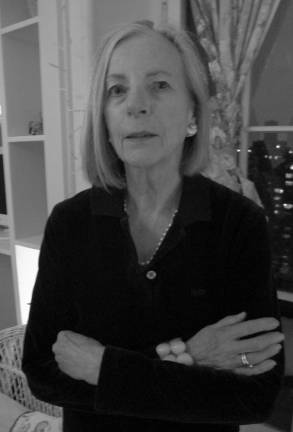One is 32, African American, grew up in Brooklyn, and has just published her first novel. The other is 81, white, grew up in Paris ... and has just published her tenth, and, quite possibly, last one. Now, they are both New Yorkers, and sharing the surreal experience of having books released at this perilous moment. Parties and public readings - forget travel - are near impossible to pull off. And, frankly, many are finding it hard to concentrate when they are worried about a spreading virus and racial tension taking thousands to the streets.
One of these women, Lily Tuck, is my neighbor: the other, Elisabeth Thomas, is the daughter of a member of a former writers’ group. Maybe it is my wrenching emotions of late - time and years thrown to the wind - but something about the “bookends” of these two womens’ careers touched me.
Both acknowledge that they were looking forward to some form of well-deserved attention. “So much of writing is internal,” says Thomas, whose debut novel, “Catherine House,” just made the New York Times’ Editors Choice list. “So of course, I was looking forward to celebrating with friends and family, and being able to talk about the book in person with people.” The plus side, if any? “Well, people like my grandparents could not have gone out for events, but they can watch them on Zoom.”
Thomas, being new and effervescent, has had a few bookstore-arranged conversations. Lily Tuck was able to have one - a sold-out conversation with Molly Haskell - at the Corner Bookstore on Madison, before all shut down. While she has a close-knit group of friends, and a sly sense of self-awareness, no one has ever accused her of being effervescent. Her new book is called “Heathcliff Redux and Other Stories.” Why the “Heathcliff” reference? Turns out, she always had a thing for the bad boy of “Wuthering Heights.” “Yes, I wanted to write about Heathcliff in some way, wondering what became of him,” she says. In the new book, the contemporary version is named Cliff.
In fact, one thing the two writers share is a fondness for Gothic-ish tales of old. “Catherine House” has been labeled such, but Thomas insists her style aims to mix and match styles. Her novel spurred a bit of a bidding war - always a good sign - but she went with Harper Collins. “They believed in it from the beginning and really got what I was doing,” she says. “So much of the book is ambiguous and crosses a lot of genres.”
“Moody and Evocative”
Her novel was written, and bought, long before COVID struck, but it turns out to fairly flexible in branding possibilities. It deals with a young woman who enters a prestigious educational facility where weird things happen, and no one dare leave or disobey. “So much of the story is about being trapped in one place,” Thomas notes, “claustrophobia with dark forces out there.” While the Washington Post called it “moody and evocative,” Goodreads comments are more varied. But Bolo Books wrote, “Elisabeth Thomas has a vital perspective to impart on the literary world – not simply because she brings much needed diversity to the forefront, but also because she comes at everything from a fresh and exciting angle.”
Tuck’s voice, spare but searing, has had its fans and detractors over the years. The high point was “News From Paraguay,” which won the National Book Award in 2004. Her sentences are crisp and often unsettling, and tend to stay with you. (“I also found out that he and Sally were sleeping together. I should have guessed that too.”)
Both these women have been well educated: Tuck at Radcliffe and the Sorbonne, Thomas at Yale. Tuck is a widow living on the Upper East Side, Thomas, is single and grew up in Brooklyn. She was an Art History major and works at MOMA, at least for now. “Catherine House” has been optioned by a production company, (“In development,” as they say) and she is working on her next book, which will also, she says, “mix realism with the paranormal.”
Neither woman has joined the protests going on around their neighborhoods: Tuck a bit frail, and Thomas also claims she has health concerns. “I feel connected, of course,” she says, “especially having lived with insidious, if subtle, racism my whole life. It’s a long time coming, and the most surprising thing is that institutions seem to finally be paying a lot of attention.”
Lily Tuck is realistic about her publishing prospects, but continues to write, if even just for herself. “What would I do all day if I didn’t?” she wonders. The ambition of her early years is tempered: that torch has been passed to others, well, like Elisabeth Thomas.
“So much of the story is about being trapped in one place, claustrophobia with dark forces out there.” Elisabeth Thomas
“I wanted to write about Heathcliff in some way, wondering what became of him.” Lily Tuck

